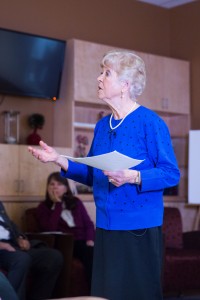
Maria Tanczak Fiddler told BYU students her story about surviving Nazi-controlled France as a young girl and called for students to cherish their liberty.
“You learn in the books about the history, but you cannot learn the feeling of the people who are left,” Fiddler said. “I want you to cherish your liberty. That’s the most precious thing you can have.”
The Department of French and Italian hosted the event Thursday, Feb. 18, at 12 p.m. in the Foreign Language Activity Center in the Joseph F. Smith Building. She also spoke in French at 4 p.m. in the Joseph F. Smith Building.
Fiddler was born in the Ukrainian village Bilche-Zolote. For political reasons, her father fled Ukraine for France. He later sent for his wife and daughter.
Rumors of war spread while Fiddler lived with her family in Paris. She said the adults talked as if she couldn’t understand because she was a child, but she could.
One day Fiddler and her family, taking with them their one suitcase, evacuated Paris with many other people.
Her mother broke off pieces of a chocolate bar for the family’s dinners along the journey. Her father would leave the road and look for food in the fields to add to the meager chocolate. She said anything he found the family ate raw.
“Go home and eat a raw potato,” Fiddler said. “It tastes pretty good, you know, when you are hungry.”
Fiddler said one day planes flew overhead. People pointed at the planes, fascinated by the sight, until the planes dove down and started firing at the travelers.
Fiddler’s mother pushed Fiddler into a ravine and covered Fiddler with her body. Fiddler squirmed and fought to break free from her mother, but her mother kept pushing her to the ground. When they finally got up, her mother realized Fiddler was lying on top of a stinging nettle plant.
She said the pilgrimage continued, and the planes kept coming. Fiddler recounted seeing dead bodies all along the way. There was nothing they could do, so they just kept walking.
“There were dead people, their arms cut off, their stomachs open. It’s a bloody road,” Fiddler said.
The traveling party stopped at a deserted town during the journey. People took freely of the many goods left behind in the town’s stores.
Fiddler found some glasses frames and took them eagerly. She believed wearing glasses made people look sophisticated. Proudly, she showed off her new look to her father.
She said he disapproved. He asked if she had paid for the glasses. She admitted she had not paid, but no one was there to pay.
“You’re stealing, aren’t you? So you’re a thief, aren’t you?” Fiddler recalled her father saying before telling her to return the glasses to the abandoned store.
Lessons came from her mother as well.
Three French soldiers asked if they could travel with the family. Fiddler’s parents agreed and provided them food out of their short supply of chocolate and vegetables. Sharing food upset Fiddler, but her mother taught her to have charity.
Her mother also taught her not to beg. She recalled German soldiers passing out round, dark bread. As Fiddler reached out her hand for bread, her mother stopped her.
“She grabbed my hand, and she said, ‘No, You’re not a beggar. If you want something, you work for it, but you don’t beg for it,'” Fiddler said.
Fiddler and her family ended up in a labor camp in northern France. People often came to visit with her parents after curfew, and time and time again, the Gestapo (the Nazi Germany police) would take her parents, according to Fiddler.
One day she waited for her parents to return from the fields, but they didn’t. A woman approached Fiddler and said her parents were gone and Fiddler should go home with her.
That night Fiddler sat at the window with the woman, and they saw people dump something out of a car and onto the street. Fiddler and the woman both thought it was garbage, but when it started to move, they went outside to see. It was Fiddler’s parents.
“It was my mom and dad. You couldn’t recognize them,” Fiddler said tearfully.
They left the camp soon after. The civilian commandant, who had always been sympathetic to Fiddler and the others, gave Fiddler’s father false papers so they could leave. He warned Fiddler’s father was to go to Auschwitz if they didn’t leave.
Later the family discovered that after they left, the military learned of the false papers. The commandant, who had a limp, was sent to the Russian front.
“He paid with his life to save our lives,” Fiddler said.
Fiddler’s family was then in Verdun. There they heard mumblings about Americans and liberation. They would hide in the woods while the Americans dropped bombs. Then liberation finally came, but it wasn’t so simple.
“I was liberated, but my soul was not liberated,” Fiddler said. “The scars sit there, and it’s hard to heal, really hard to heal. You forget? No. You don’t forget.”
She said there is a lot more that she remembers but couldn’t share. This was the last time, Fiddler said, she was going to tell her story.




